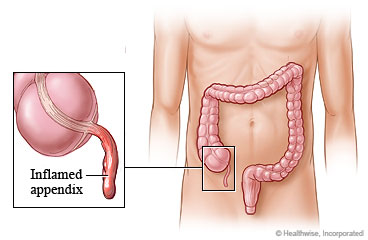
Overview
Your doctor thinks you may have appendicitis. This means that your appendix may be infected. The appendix is a small sac that is shaped like a finger. It's attached to your large intestine.
Sometimes it's hard to tell if a person has appendicitis. It is especially hard to tell in children, pregnant women, and older adults. If your doctor thinks it's possible that you have appendicitis, more tests may be ordered. Or your doctor may want to wait to see if your symptoms change.
Your doctor thinks it's okay for you to go home right now. But you will need to watch for symptoms of appendicitis at home. If your symptoms continue or get worse, it's important to call your doctor or get medical care right away. If you do have appendicitis, it can get serious very quickly and your appendix may need to be removed.
Follow-up care is a key part of your treatment and safety. Be sure to make and go to all appointments, and call your doctor if you are having problems. It's also a good idea to know your test results and keep a list of the medicines you take.
How can you care for yourself at home?
- Do not eat or drink anything, unless your doctor says it is okay. If you need surgery, it's best to have an empty stomach. If you're thirsty, you can rinse your mouth with water.
- Do not take laxatives. If you have appendicitis, they can make the appendix burst.
- Follow your doctor's instructions about taking medicines. Your doctor may tell you not to take antibiotics or pain pills. These medicines can make it harder to tell if you have appendicitis.
- Watch for symptoms of appendicitis. These include severe belly pain, fever, nausea, and vomiting. It is very important to follow your doctor's instructions about getting treatment if you have these symptoms.
When should you call for help?
Call your doctor now or seek immediate medical care if:
- You have new or worse belly pain. Or the pain has become focused in one area of your belly.
- You have nausea and don't want to eat.
- You are vomiting.
- You have a fever.
- You cannot pass stools or gas.
Watch closely for changes in your health, and be sure to contact your doctor if:
- You do not get better as expected.
Where can you learn more?
Go to http://www.healthwise.net/patientEd
Enter J463 in the search box to learn more about "Possible Appendicitis: Care Instructions".
Current as of: July 31, 2024
Author: Ignite Healthwise, LLC Staff
Clinical Review Board
All Healthwise education is reviewed by a team that includes physicians, nurses, advanced practitioners, registered dieticians, and other healthcare professionals.

